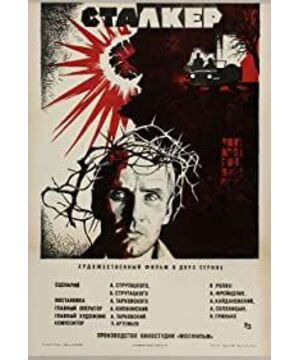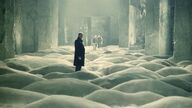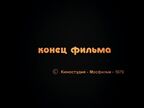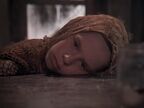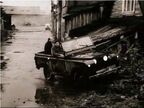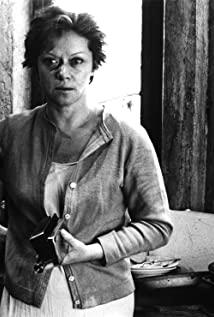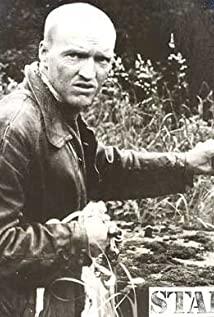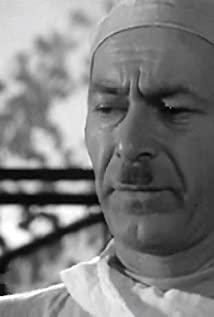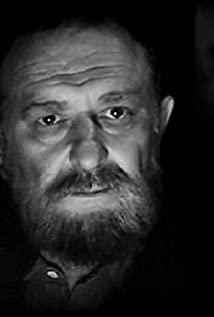Andrei Tarkovsky was born in the Soviet Union to the poet Arseniy Tarkovsky and studied at the Soviet Film Academy. He has made seven and a half films in his life. After "Ivan's Childhood" won the Golden Lion Award at the Venice Film Festival in 1962, each of his films has gained international reputation. His last work "Sacrifice" won the 1986 Cannes Film Festival. Film Festival Jury Special Award. Together with Fellini and Bergman, it is called the "Holy Trinity".
Tarkovsky put forward the concept of "carving time" for the film, he once said: "The director uses the 'image of the finished product in the heart' (the author's space-time body) to carve the 'big time' composed of real life, so as to ensure that The 'element of image integrity' ultimately creates the image space-time body. Film is the art of time, and how to convey the director's inner feelings in every frame, so that the audience can get the soul resonance of the underlying layer in the picture, is the director's Art. Tarkovsky's films are opposed to the Soviet montage school of Eisenstein and Pudovkin, because he believes that in the form of sideshow montage, close-up, etc., the director replaces the audience to choose the viewpoint and controls the audience's attention. A kind of "dictatorship of thought". This makes it impossible for the audience to think in the image and use self-consciousness to speculate and feel the picture. Tarkovsky believes that once the film contacts the audience, it facilitates the audience to separate and begin to live independently. , experiencing changes in form and meaning.” Therefore, his films often use long and wide-angle shots, and the characters move freely in the frame, abandoning the front and back shots during the characters’ dialogues, and completely using stage scheduling to place the characters in the same scene. narrative in. This kind of film practice is in line with Andre Bazin's film theory.
In "Stalker", when the writer and others came to the cell in the "district", the three were hesitant to go in. The three became timid outside the cell, realizing that their inner desires and desires were Impure, suspicious of such a power that can fulfill people's wishes, scientists even want to bomb the prison cell to destroy the stalker's place of belief. Tarkovsky uses a long shot to show the inner struggle of the three outside the prison. Such a treatment, as André Bazin said in What Is Cinema: "The entire field of view in the same dramatic environment is captured with the same clarity, with frequent panning and the actor's entry into the scene. Instead of splitting shots, respect the continuity of the dramatic space of events, the continuity of time and the actual connection of things.”
But the difference is that Tarkovsky is extremely disgusted with the so-called "dramatic" movies. In his view, film should be constantly differentiated from other art forms to establish the uniqueness of film art, and film art is different from drama art, so it does not need to rely on the plot and characters in the drama to weave time and space. Therefore, he emphasizes the "poetry" presented by the film. The so-called poetry should be based on the simplest and most in line with the original image of life, the wisdom and inner emotions that penetrate into the highest level of mankind. Therefore, on the one hand, "Tarkovsky" emphasizes the "authenticity" of the film, and on the other hand, he uses Japanese haiku as the closest example of film poetry to achieve the poeticization of his films. He tried to use the simplest picture of life in the film, just like the simple three-line poem in a haiku, through the recording and observation under the surface of life, to find the most sincere and moving poetry.
In Tarkovsky's semi-autobiographical film "Mirror", the director tried to divide the film paragraphs into four paragraphs: "reality, dream, heart, and documentary", breaking the continuity of the plot and completely replacing the author's most potential inner feelings. description. And alternately edit reality and fantasy, like a stream of consciousness processing. At the beginning of the movie, the mother sits on the fence, waiting for the father's return, but the father never appears, revealing the impact of being a father's "absence" on the family. After that, there is the humiliation of the mother by colleagues at work, and the joyful play between the father and mother in the forest, etc. There is no continuity between these passages, and they are constructed entirely by the logic of psychological underlying layers and memories. However, when the audience watches the film, through this disorderly arrangement, they can realize the poetry and emotion contained in it. During the viewing process, the audience not only has a conceptual understanding of the characters like a drama film, but also puts the level of appreciation into the broad, rambling and trivial life. In Tarkovsky's view, the structure of the so-called "dramatic film" is only to create an inevitable result, and the audience is no longer concerned about the process. And this kind of breaking the plot, returning to the treatment of people and life itself, is to let the audience focus on the process and realize the poetry in life.
The expression montage theory of the Soviet Union in the 1920s was based on the expression method of "poetry", which was consistent with the characteristics of pure visual art to reflect life since silent films. Literary and art theorist Klovsky defined a poetic film in "Aesthetics of Film": "A film without a plot is a film of poetry." At that time, many scholars also put Tarkovsky in the "poetry" school. in the ranks of movies. Tarkovsky, however, was not satisfied with such a division in his own "Sculpting Time". In the book, he said: "The method of classical drama is always to connect the images in a straight line according to the rigid logic of the plot, but poetry can avoid this drawback in film creation, because the reasoning process of poetry is closer than that of traditional drama. The law of development of thought is also closer to life itself." In his view, "poetry" is more an understanding of the essence of life, not just borrowing from literary genres, not just a traditional drama mode is different. Moreover, Tarkovsky believed that the poetic films at that time ignored the "authenticity" of the film in order to create poetry deliberately. The use of facts to record the passage of time is the most basic concept of film, which cannot be broken.
In Tarkovsky's films, we can see his adherence to the basic principle of the reduction of the material world. Although in his films, there are often dreams and memories that do not match the real time and space. But he still insists on taking the most essential real space when shooting these paragraphs. For example, in "Andrei Rublev", the craftsman follows the hot air balloon to fly into space and finally falls to the ground. When the hot air balloon takes off, the whole village and town can be seen as the hot air balloon soars. , showing the entire social picture at that time, showing a grand and magnificent poetic. In the final fall, the director cut to the scene of the horse rolling on the ground, and used a poetic sense to indicate the same insignificant artistic conception of human beings and all living beings. poetic expression. And the shots he chooses to use are real. In addition, for example, in "Flying to Space", the wife comes out of the window, in "Stalker", the stalker lies in bed and suffers from the lack of inner belief. In "Mirror", the burning grass hut is all Tarkovs Based on the poetry of "authenticity".
Around the poetry of Tarkovsky's films, in Tarkovsky's films, what we feel is not only from the original poetry of life, but also from a sense of life and the world. Initial thinking. And Tarkovsky found his direction in Eastern philosophy, and in movies, he often chooses to imply such thinking in the characters' lines, which makes the poetry in the film sublime rationally and speculatively, and makes the creation of the film. The mood is more sublime. This kind of processing also allows the audience to follow the characters to think actively when watching the film. In watching and thinking, the expression of the image can make the audience feel the poetry contained in it. For example, in "Sacrifice", when the news that the nuclear bomb is about to be launched is known to the family, the emotional mother, after taking a sedative, said about the strength and weakness of the husband and wife in the family. It draws on Taoism's yin and yang idea of mutual growth and mutual restraint. In "Nostalgia", Andre crossed the pond three times to light the candle in order to light the candle in the water, which contains the concept of "crossing" in Buddhism, and Andre's thinking and yearning for the other side.
Of course, Tarkovsky grew up in a Western context, and the Western classical aesthetics and Christian culture were naturally integrated into his thinking system. Taking "Nostalgia" as an example, it is not difficult to find the solemn and solemn composition with a sense of classical painting. At the end of the film, as the camera pans down, Andre leans against the majestic church, sits in a fat rain pond, and stares blankly at himself reflected in the water. This kind of treatment implies that the hero is returning to his idyllic countryside, taking care of the pond in Andre's hometown at the beginning of the film. The building behind is a symbol of sanctification, an externalization of inner peace and purification. Another point is that Dominica preached her own teachings and ideas in the square, trying to awaken people's inner conscience through self-immolation. In contrast, the audience in the square was not gathered around Dominica, but scattered in an orderly manner. Standing on the steps reveals a classical sense of order and solemnity. They kept silent, didn't care about the lunatic in front of them, and stood there with an unspeakable silence. Such a picture is like the "Bible" in which Jesus nailed himself to the cross in order to wash away the sins of the world with blood, just like Dominic's self-immolation. But the death of Jesus did not cause the world to repent, and even doubted the identity of Jesus until the resurrection of Jesus. But Dominic can't be resurrected, and he can't wake up the world. Just like the indifferent bystanders lined up on the stairs, people no longer have faith. This is like the stalker in "Stalker" who can't get spiritual satisfaction in real life, so he can only hope in the "zone", in the process of helping people realize their wishes, to awaken their own beliefs and thirst for miracles, to fill them up The emptiness and numbness of real life, like the spectator in Nostalgia.
In addition, in Tarkovsky's films, he hopes that the actors can always maintain "restraint" and not show their emotions at will, so as to keep the space and the characters as one, without deliberately emphasizing a certain subject and letting everything in the shot be There is a harmonious wholeness, but this is not done very well in his final film, "Sacrifice," when Tarkovsky gives his mother a minute-long , to show her emotional breakdown, so that the overall quietness of the film is destroyed by such abrupt performances.
Although there are not many films in Tarkovsky's life, it does not prevent him from being famous in film history. As he once wrote: "My immortality is enough." In addition, in "Sculpting Time", Tarkovsky once compared the artist to the servant of God, and talent is the shackle that God has given you. His whole life has been trying to fulfill the mission given to him by God. He was not satisfied with the "consumerism" that prevailed in the Soviet Union at that time, but resolutely explored the art of film. Not trying to cater to any ideological theory, but insisting on self-exploration, creating a unique form of film expression, and fighting for it all my life. Such a sense of mission is worthy of reference for all artists. His life is just as his friend commented on a painting sent to him: "Odin, the main god of the pantheon, has only one eye, and in order to drink from the fountain of wisdom under the tree of the world, Igdelar, he put himself The only eye that was given, remained in the spring forever. And Tarkovsky left one eye in the film and gained wisdom."
View more about Stalker reviews


